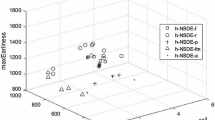Abstract
Generally, ideal manufacturing system environments are assumed before determining effective scheduling. However, the original schedule is no longer optimal or even to be infeasible due to many uncertain events. This paper investigates a multi-objective inverse scheduling problem in single-machine shop system with due-dates and uncertain processing parameters. Moreover, in order to more close the addressed problem into the situations encountered in real world, the processing parameters are considered to be uncertain stochastic parameters. First, a comprehensive mathematical model for multi-objective single-machine inverse scheduling problem (MSMISP) is addressed. Second, an effective hybrid multi-objective evolutionary algorithm (HMNL) is proposed to handle uncertain processing parameters (uncertainties) and multiple objectives at the same time. In HMNL, using an effective decimal system encoding scheme and genetic operators, the non-dominated sorting based on NSGA-II is adapted for the MSMISP. In addition, hybrid HMNL are proposed by incorporating an adaptive local search scheme into the well-known NSGA-II, where applies a separate local search process, total six strategies, to improve quality of solutions. Furthermore, an on-demand layered strategy is embedded into the elitism strategy to keep the population diversity. Afterwards, an external archive set is dynamically updated, where a non-dominated solution is selected to participate in the creation of the new population. Finally, 36 public problem instances with different scales and statistical performance comparisons are provided for the HMNL algorithm. This paper is the first to propose a mathematical model and develop a hybrid MOEA algorithm to solve MSMISP in inverse scheduling domain.


















Similar content being viewed by others
Abbreviations
- n :
-
Number of jobs
- \(J_{j}\) :
-
Job j(j= 1, 2,..., n)
- \(\sigma \) :
-
A processing sequence of jobs
- \(P_{j}\) :
-
Normal processing time of job j
- \(\bar{p}_j\) :
-
Adjusted processing time of job j
- \(d_{j}\) :
-
Due date of job j
- \(\bar{d}_j\) :
-
Adjusted due date of job j
- \(C_{j}\) :
-
Completion time of job j
- \(\bar{c}_j\) :
-
Adjusted completion time of job j
- \(\bar{T}_j\) :
-
Tardiness of job j, \(T_{j}\) = max(0, \(\bar{c}_j -d_{j})\)
- \(\bar{E}_j\) :
-
Earliness of job j, \(E_{j}\) = max(0, \(d_{j}-\bar{c}_j )\)
References
Kaplanoğlu, V.: An object-oriented approach for multi-objective flexible job-shop scheduling problem. Expert Syst. Appl. 45, 71–84 (2016)
Brucker, P., Shakhlevich, N.V.: Inverse scheduling with maximum lateness objective. J. Sched. 12(5), 475–488 (2009)
Brucker, P., Shakhlevich, N.V.: Inverse scheduling: two-machine flow-shop problem. J. Sched. 14(3), 239–256 (2011)
Li, S.S., Brucker, P., Ng, C.T., Cheng, T.E., Shakhlevich, N.V., Yuan, J.J.: A note on reverse scheduling with maximum lateness objective. J. Sched. 16(4), 417–422 (2013)
Heuberger, C.: Inverse combinatorial optimization: a survey on problems, methods and results. J. Comb. Optim. 8, 329–361 (2004)
Koulamas, C.: Inverse scheduling with controllable job parameters. Int. J. Serv. Oper. Manag. 1(1), 35–43 (2005)
Chen, R.J., Chen, F., Tang, G.C.: Inverse problems of a single machine scheduling to minimize the total completion time. J. Shanghai Second Polytech. Univ. 22(2), 1–7 (2005)
Chen, R.J., Tang, G.C.: Inverse problems of supply chain scheduling and flow shop scheduling. Oper. Res. Manag. Sci. 18(2), 80–84 (2009)
Chen, J.F.: Unrelated parallel-machine scheduling to minimize total weighted completion time. J. Intell. Manuf. 26(6), 1099–1112 (2015)
Pham, H., Lu, X.W.: Inverse problem of total weighted completion time objective with unit processing time on identical parallel machines. J. East China Univ. Sci. Technol. 38(6), 757–761 (2012)
Li, X., Gao, L.: An effective hybrid genetic algorithm and tabu search for flexible job shop scheduling problem. Int. J. Prod. Econ. 174, 93–110 (2016)
Chiang, T.C., Cheng, H.C., Fu, L.C.: NNMA: an effective memetic algorithm for solving multiobjective permutation flow shop scheduling problems. Expert Syst. Appl. 38(5), 5986–5999 (2011)
Rasoulzadeh-akhijahani, A., Mohammadi-ivatloo, B.: Short-term hydrothermal generation scheduling by a modified dynamic neighborhood learning based particle swarm optimization. Int. J. Electr. Power Energy Syst. 67, 350–367 (2015)
Nouiri, M., Bekrar, A., Jemai, A., Niar, S., Ammari, A.C.: An effective and distributed particle swarm optimization algorithm for flexible job-shop scheduling problem. J. Intell. Manuf. 1–13 (2015)
Rossi, A.: Flexible job shop scheduling with sequence-dependent setup and transportation times by ant colony with reinforced pheromone relationships. Int. J. Prod. Econ. 153, 253–267 (2014)
Neto, R.T., Godinho Filho, M.: Literature review regarding ant colony optimization applied to scheduling problems: guidelines for implementation and directions for future research. Eng. Appl. Artif. Intell. 26(1), 150–161 (2013)
Huacuja, H.J.F., Santiago, A., Pecero, J.E., Dorronsoro, B., Bouvry, P., Monterrubio, J. C. S., et al.: A comparison between memetic algorithm and seeded genetic algorithm for multi-objective independent task scheduling on heterogeneous machines. In: Design of Intelligent Systems Based on Fuzzy Logic, Neural Networks and Nature-Inspired Optimization, pp. 377–389 (2015)
Moschakis, I.A., Karatza, H.D.: Towards scheduling for Internet-of-Things applications on clouds: a simulated annealing approach. Concurr. Comput.: Pract. Exp. 27(8), 1886–1899 (2015)
Peng, B., Lü, Z., Cheng, T.C.E.: A tabu search/path relinking algorithm to solve the job shop scheduling problem. Comput. Oper. Res. 53, 154–164 (2015)
Mjirda, A., Jarboui, B., Macedo, R., Hanafi, S., Mladenović, N.: A two phase variable neighborhood search for the multi-product inventory routing problem. Comput. Oper. Res. 52, 291–299 (2014)
Glotic, A., Kitak, P., Pihler, J., Ticar, I.: Parallel self-adaptive differential evolution algorithm for solving short-term hydro scheduling problem. IEEE Trans. Power Syst. 29(5), 2347–2358 (2014)
Komaki, G.M., Kayvanfar, V.: Grey Wolf optimizer algorithm for the two-stage assembly flow shop scheduling problem with release time. J. Comput. Sci. 8, 109–120 (2015)
Fang, N., Zhou, J., Zhang, R., Liu, Y., Zhang, Y.: A hybrid of real coded genetic algorithm and artificial fish swarm algorithm for short-term optimal hydrothermal scheduling. Int. J. Electr. Power Energy Syst. 62, 617–629 (2014)
Qiu, X., Lau, H.Y.: An AIS-based hybrid algorithm for static job shop scheduling problem. J. Intell. Manuf. 25(3), 489–503 (2014)
Xie, Z., Zhang, C., Shao, X., Lin, W., Zhu, H.: An effective hybrid teaching-learning-based optimization algorithm for permutation flow shop scheduling problem. Adv. Eng. Softw. 77, 35–47 (2014)
Rabiee, M., Rad, R.S., Mazinani, M., Shafaei, R.: An intelligent hybrid meta-heuristic for solving a case of no-wait two-stage flexible flow shop scheduling problem with unrelated parallel machines. Int. J. Adv. Manuf. Technol. 71(5–8), 1229–1245 (2014)
Rohaninejad, M., Kheirkhah, A., Fattahi, P., Vahedi-Nouri, B.: A hybrid multi-objective genetic algorithm based on the ELECTRE method for a capacitated flexible job shop scheduling problem. Int. J. Adv. Manuf. Technol. 77(1–4), 51–66 (2015)
Aghassi, H., Abadi, S.N., Roghanian, E.: A multi-objective genetic algorithm for optimization time-cost trade-off scheduling. In: Knowledge Technology, pp. 356–359. Springer, Berlin (2012)
Zandieh, M., Karimi, N.: An adaptive multi-population genetic algorithm to solve the multi-objective group scheduling problem in hybrid flexible flowshop with sequence-dependent setup times. J. Intell. Manuf. 22(6), 979–989 (2011)
Rahmati, S.H.A., Zandieh, M., Yazdani, M.: Developing two multi-objective evolutionary algorithms for the multi-objective flexible job shop scheduling problem. Int. J. Adv. Manuf. Technol. 64(5–8), 915–932 (2013)
Khajemohammadi, H., Fanian, A., Gulliver, T.A.: Efficient workflow scheduling for grid computing using a leveled multi-objective genetic algorithm. J. Grid Comput. 12(4), 637–663 (2014)
Sedaghat, N., Tabatabaee-Yazdi, H., Akbarzadeh T.M.R.: Pareto front based realistic soft real-time task scheduling with multi-objective genetic algorithm in unstructured heterogeneous distributed system. In: Advances in Grid and Pervasive Computing, pp. 268–279. Springer, Berlin (2010)
Arakawa, M.: Hierarchy genetic algorithm to solve multi-objective scheduling problems involving various types of assignments for parallel processing system. In: Service Robotics and Mechatronics, pp. 251–256. Springer, London (2010)
Umar, U.A., Ariffin, M.K.A., Ismail, N., Tang, S.H.: Hybrid multiobjective genetic algorithms for integrated dynamic scheduling and routing of jobs and automated-guided vehicle (AGV) in flexible manufacturing systems (FMS) environment. Int. J. Adv. Manuf. Technol. 81(9–12), 2123–2141 (2015)
Abdelmaguid, T.F.: A neighborhood search function for flexible job shop scheduling with separable sequence-dependent setup times. Appl. Math. Comput. 260, 188–203 (2015)
Goldberg, D.: Genetic Algorithms in Search, Optimization, and Machine Learning. Addison-Wesley, Boston (1989)
Jakobovic, D., Budin, L.: Dynamic scheduling with genetic programming. Lecture Notes in Computer Science, vol. 3905, pp. 73–84 (2006)
Acknowledgements
The authors would like to thank the editor and anonymous referees whose comments helped a lot in improving this paper. This research work was supported by the National Science Foundation of China (NSFC) under Grant No. 51605267; the Natural Science Foundation of Shandong Province, China, under Grant No. ZR2016EEQ07; and Colleges and universities of Shandong province science and technology plan projects under Grant No. J16LB04.
Author information
Authors and Affiliations
Corresponding author
Rights and permissions
About this article
Cite this article
Mou, J., Gao, L., Li, X. et al. Multi-objective inverse scheduling optimization of single-machine shop system with uncertain due-dates and processing times. Cluster Comput 20, 371–390 (2017). https://doi.org/10.1007/s10586-016-0717-z
Received:
Revised:
Accepted:
Published:
Issue Date:
DOI: https://doi.org/10.1007/s10586-016-0717-z




